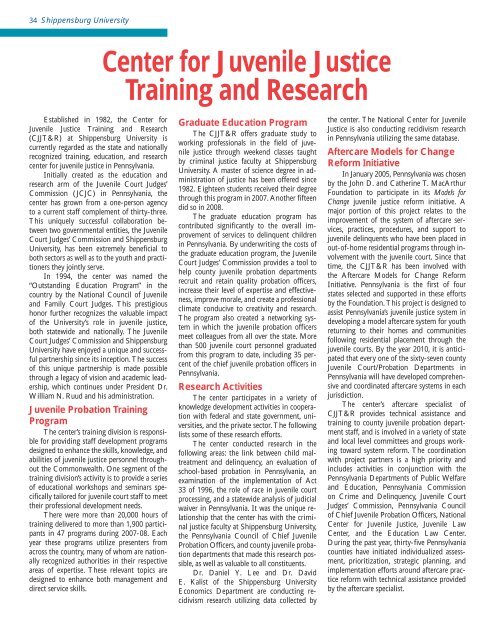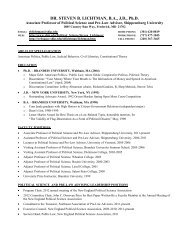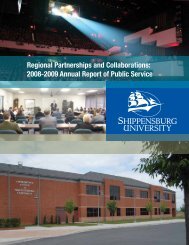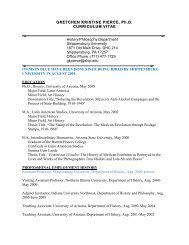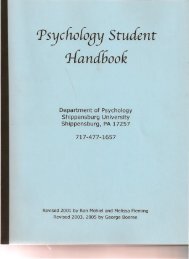2007-2008 Annual Report of Service - Shippensburg University
2007-2008 Annual Report of Service - Shippensburg University
2007-2008 Annual Report of Service - Shippensburg University
Create successful ePaper yourself
Turn your PDF publications into a flip-book with our unique Google optimized e-Paper software.
34 <strong>Shippensburg</strong> <strong>University</strong><br />
Center for Juvenile Justice<br />
Training and Research<br />
Established in 1982, the Center for<br />
Juvenile Justice Training and Research<br />
(CJJT&R) at <strong>Shippensburg</strong> <strong>University</strong> is<br />
currently regarded as the state and nationally<br />
recognized training, education, and research<br />
center for juvenile justice in Pennsylvania.<br />
Initially created as the education and<br />
research arm <strong>of</strong> the Juvenile Court Judges’<br />
Commission ( JCJC) in Pennsylvania, the<br />
center has grown from a one-person agency<br />
to a current staff complement <strong>of</strong> thirty-three.<br />
This uniquely successful collaboration between<br />
two governmental entities, the Juvenile<br />
Court Judges’ Commission and <strong>Shippensburg</strong><br />
<strong>University</strong>, has been extremely beneficial to<br />
both sectors as well as to the youth and practitioners<br />
they jointly serve.<br />
In 1994, the center was named the<br />
“Outstanding Education Program” in the<br />
country by the National Council <strong>of</strong> Juvenile<br />
and Family Court Judges. This prestigious<br />
honor further recognizes the valuable impact<br />
<strong>of</strong> the <strong>University</strong>’s role in juvenile justice,<br />
both statewide and nationally. The Juvenile<br />
Court Judges’ Commission and <strong>Shippensburg</strong><br />
<strong>University</strong> have enjoyed a unique and successful<br />
partnership since its inception. The success<br />
<strong>of</strong> this unique partnership is made possible<br />
through a legacy <strong>of</strong> vision and academic leadership,<br />
which continues under President Dr.<br />
William N. Ruud and his administration.<br />
Juvenile Probation Training<br />
Program<br />
The center’s training division is responsible<br />
for providing staff development programs<br />
designed to enhance the skills, knowledge, and<br />
abilities <strong>of</strong> juvenile justice personnel throughout<br />
the Commonwealth. One segment <strong>of</strong> the<br />
training division’s activity is to provide a series<br />
<strong>of</strong> educational workshops and seminars specifically<br />
tailored for juvenile court staff to meet<br />
their pr<strong>of</strong>essional development needs.<br />
There were more than 20,000 hours <strong>of</strong><br />
training delivered to more than 1,900 participants<br />
in 47 programs during <strong>2007</strong>-08. Each<br />
year these programs utilize presenters from<br />
across the country, many <strong>of</strong> whom are nationally<br />
recognized authorities in their respective<br />
areas <strong>of</strong> expertise. These relevant topics are<br />
designed to enhance both management and<br />
direct service skills.<br />
Graduate Education Program<br />
The CJJT&R <strong>of</strong>fers graduate study to<br />
working pr<strong>of</strong>essionals in the field <strong>of</strong> juvenile<br />
justice through weekend classes taught<br />
by criminal justice faculty at <strong>Shippensburg</strong><br />
<strong>University</strong>. A master <strong>of</strong> science degree in administration<br />
<strong>of</strong> justice has been <strong>of</strong>fered since<br />
1982. Eighteen students received their degree<br />
through this program in <strong>2007</strong>. Another fifteen<br />
did so in <strong>2008</strong>.<br />
The graduate education program has<br />
contributed significantly to the overall improvement<br />
<strong>of</strong> services to delinquent children<br />
in Pennsylvania. By underwriting the costs <strong>of</strong><br />
the graduate education program, the Juvenile<br />
Court Judges’ Commission provides a tool to<br />
help county juvenile probation departments<br />
recruit and retain quality probation <strong>of</strong>ficers,<br />
increase their level <strong>of</strong> expertise and effectiveness,<br />
improve morale, and create a pr<strong>of</strong>essional<br />
climate conducive to creativity and research.<br />
The program also created a networking system<br />
in which the juvenile probation <strong>of</strong>ficers<br />
meet colleagues from all over the state. More<br />
than 500 juvenile court personnel graduated<br />
from this program to date, including 35 percent<br />
<strong>of</strong> the chief juvenile probation <strong>of</strong>ficers in<br />
Pennsylvania.<br />
Research Activities<br />
The center participates in a variety <strong>of</strong><br />
knowledge development activities in cooperation<br />
with federal and state government, universities,<br />
and the private sector. The following<br />
lists some <strong>of</strong> these research efforts.<br />
The center conducted research in the<br />
following areas: the link between child maltreatment<br />
and delinquency, an evaluation <strong>of</strong><br />
school-based probation in Pennsylvania, an<br />
examination <strong>of</strong> the implementation <strong>of</strong> Act<br />
33 <strong>of</strong> 1996, the role <strong>of</strong> race in juvenile court<br />
processing, and a statewide analysis <strong>of</strong> judicial<br />
waiver in Pennsylvania. It was the unique relationship<br />
that the center has with the criminal<br />
justice faculty at <strong>Shippensburg</strong> <strong>University</strong>,<br />
the Pennsylvania Council <strong>of</strong> Chief Juvenile<br />
Probation Officers, and county juvenile probation<br />
departments that made this research possible,<br />
as well as valuable to all constituents.<br />
Dr. Daniel Y. Lee and Dr. David<br />
E. Kalist <strong>of</strong> the <strong>Shippensburg</strong> <strong>University</strong><br />
Economics Department are conducting recidivism<br />
research utilizing data collected by<br />
the center. The National Center for Juvenile<br />
Justice is also conducting recidivism research<br />
in Pennsylvania utilizing the same database.<br />
Aftercare Models for Change<br />
Reform Initiative<br />
In January 2005, Pennsylvania was chosen<br />
by the John D. and Catherine T. MacArthur<br />
Foundation to participate in its Models for<br />
Change juvenile justice reform initiative. A<br />
major portion <strong>of</strong> this project relates to the<br />
improvement <strong>of</strong> the system <strong>of</strong> aftercare services,<br />
practices, procedures, and support to<br />
juvenile delinquents who have been placed in<br />
out-<strong>of</strong>-home residential programs through involvement<br />
with the juvenile court. Since that<br />
time, the CJJT&R has been involved with<br />
the Aftercare Models for Change Reform<br />
Initiative. Pennsylvania is the first <strong>of</strong> four<br />
states selected and supported in these efforts<br />
by the Foundation. This project is designed to<br />
assist Pennsylvania’s juvenile justice system in<br />
developing a model aftercare system for youth<br />
returning to their homes and communities<br />
following residential placement through the<br />
juvenile courts. By the year 2010, it is anticipated<br />
that every one <strong>of</strong> the sixty-seven county<br />
Juvenile Court/Probation Departments in<br />
Pennsylvania will have developed comprehensive<br />
and coordinated aftercare systems in each<br />
jurisdiction.<br />
The center’s aftercare specialist <strong>of</strong><br />
CJJT&R provides technical assistance and<br />
training to county juvenile probation department<br />
staff, and is involved in a variety <strong>of</strong> state<br />
and local level committees and groups working<br />
toward system reform. The coordination<br />
with project partners is a high priority and<br />
includes activities in conjunction with the<br />
Pennsylvania Departments <strong>of</strong> Public Welfare<br />
and Education, Pennsylvania Commission<br />
on Crime and Delinquency, Juvenile Court<br />
Judges’ Commission, Pennsylvania Council<br />
<strong>of</strong> Chief Juvenile Probation Officers, National<br />
Center for Juvenile Justice, Juvenile Law<br />
Center, and the Education Law Center.<br />
During the past year, thirty-five Pennsylvania<br />
counties have initiated individualized assessment,<br />
prioritization, strategic planning, and<br />
implementation efforts around aftercare practice<br />
reform with technical assistance provided<br />
by the aftercare specialist.


